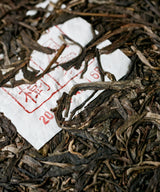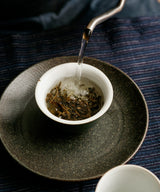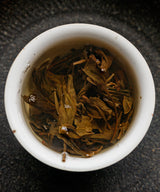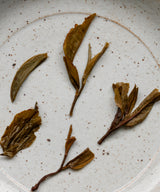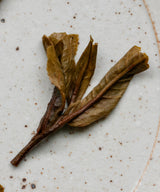Guafengzhai 2018
刮风寨古树生普2018
Harvest
April 2018
Origin
Guafengzhai, Yiwu, Yunnan
Most pu’erhs come from villages we would call remote, but Guafengzhai might represent an extreme within this category. With just over 100 households, Guafengzhai is the largest and most remote village of Yiwu County in Yunnan. It is about a 30 minute walk away from the border between Yunnan and Laos.
I have long been fascinated by the mysterious name of this village. The name is made up of 3 characters, the first two, “guafeng,” mean “wind blowing” and “zhai” means “ancient village.” The way these terms are combined and pronounced in “ Guafengzhai” implies ominous and mythical undertones.
The people that live in this mysterious place are of the Yao Minority group, and are revered for being extremely adept at climbing the steep slopes of the mountains and forests that surround their village. Their skill has meant that, historically, Guafengzhai has been a place where pu’erh tea gathered from the surrounding mountains and forests is crafted and distributed. In fact, the village itself does not have any tea trees – pu’erh will not grow there, as it is too windy. And still, pu’erh tea from Guafengzhai is highly regarded and sought after.
To make the tea that we say comes from Guafengzhai requires a trek 4 to 5 hours from the village, and involves summiting 3 mountain tops, in order to access the ancient tea gardens where the leaves are harvested.
These ancient tea trees, hidden high up in the mountains, were planted in the Ming Dynasty. We consider them to be wild tea trees, as the Yao people have never managed them; they let them thrive on their own in the wild, undisturbed. Nevertheless, the Yao people maintain a deep connection to the ancient tea trees in their mountains. They carefully map out each and every one of them scattered throughout the vast, wild mountains that make up their territory. They are the keepers and stewards of these trees, as no one else would be able to find them.
We notice the distinct energetics of this tea before its taste or mouthfeel. It lands very deeply in the body, bringing a strong force with it. The taste is almost medicinal, and the liquor is heavy as it passes across the palate.
This tea satisfies a want to be nurtured, met, or contained. It is a humbling tea to drink, as it brings us close to the extreme wilderness of the mountains – a place quite indifferent to humans – and comes from trees that inhabit a scale of time far greater than our own.
. . .
Brewing guide
| Tea | 4 g |
| Temperature |
100°C |
| Water | 120 ml |
| Steep time | 10 - 60 sec |
| No. of infusions | 10+ |

